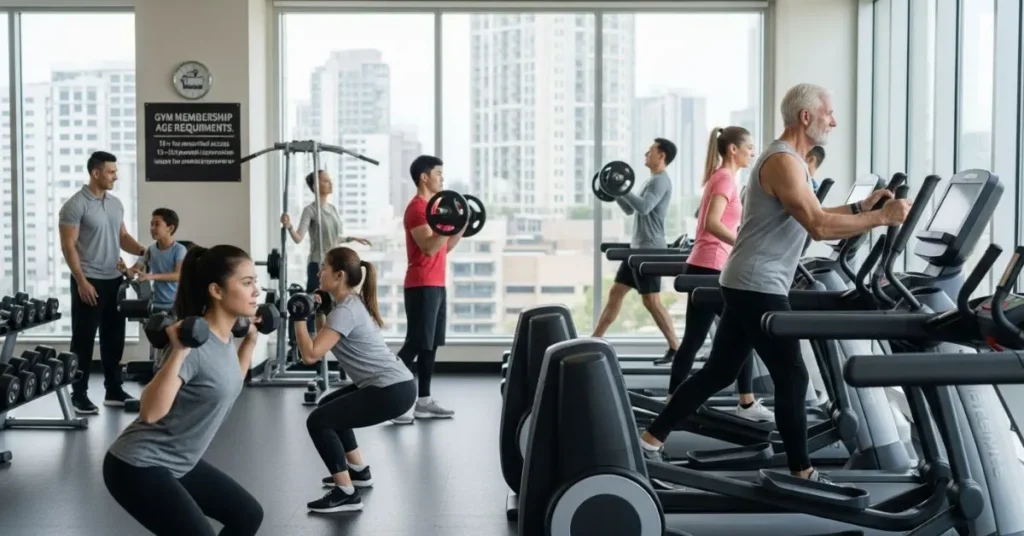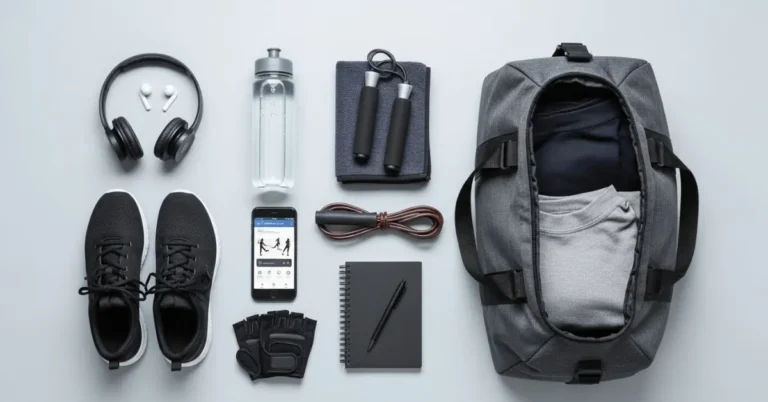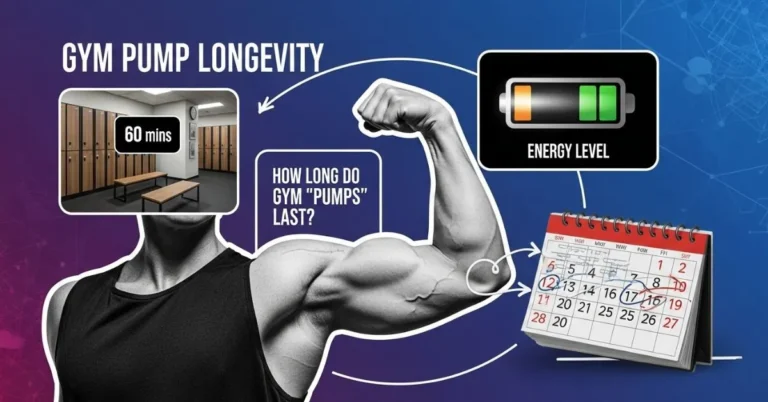
Let me take you back to my early teens, when I first started wondering what age can you be to go to the gym for weight loss. . I was 14, hovering awkwardly in the corner of a brightly lit gym, completely overwhelmed by the clash of clanking weights and the unmistakable scent of determination (mixed with protein shakes and a lot of sweat). After weeks of pleading, I finally convinced my parents to let me join, hoping to lose a few pounds and maybe find self-confidence along the way. I didn’t realise back then that the question echoing in my head was one many others were quietly asking, too and it’s more layered than it seems.
If you’re asking the same question today whether you’re a concerned parent, a motivated teen, or an adult thinking it’s too late you’re in the right place. Let’s unravel the truth about age, fitness, and the path to a healthier you.
Contents
- 1 How Old Do You Have to Be to Go to the Gym?
- 1.1 Is It Safe for Teens to Hit the Gym for Weight Loss?
- 1.2 Adults: It’s Never Too Late to Start
- 1.3 Over 50? The Gym Might Be Your Best Friend
- 1.4 Teen, Adult, or Senior: Nutrition Still Rules the Kingdom
- 1.5 Age-Appropriate Gym Plans for Weight Loss
- 1.6 Informational Product Recommendations (Not Salesy Just Smart)
- 1.7 Fitness Trends by Generation
- 1.8 FAQs – Real Answers to Real Questions
- 1.9 Expert Thoughts: Fitness Has No Age Limit
- 1.10 About the Author
How Old Do You Have to Be to Go to the Gym?
The answer isn’t quite black and white. Across the United States, gym access is largely dictated by gym-specific policies and state regulations rather than federal law. But the short version? Most gyms let teens join at age 13 or 14 with a parent, and 16+ without supervision.
Here’s a Quick Breakdown of Gym Age Rules:
| Gym Chain | Minimum Age (Unsupervised) | With Parental Consent/Supervision |
| Planet Fitness | 15+ | 13+ with parent supervision |
| LA Fitness | 16+ | 13-15 with a guardian |
| YMCA | Varies (12-14+) | Allowed with orientation or adult |
| Anytime Fitness | 18+ | Rare exceptions |
So, what age can you be to go to the gym for weight loss? Typically 13 and up, you’ll need mom, dad, or a legal guardian tagging along at least at first.
Is It Safe for Teens to Hit the Gym for Weight Loss?
Yes, but with a few caveats. Once upon a time, myths floated around that strength training would mess with a teen’s growth plates. Thankfully, today’s science has squashed that idea.
The American Academy of Paediatrics and the CDC agree that teens can safely work out in a gym if the training is properly supervised and focused on technique, not lifting like Arnold Schwarzenegger.
Key Teen Fitness Benefits:
- Helps manage weight and body fat
- Improves self-esteem and mental health
- Builds muscle strength and bone density
- Encourages lifelong healthy habits
Reminder: Teens’ goals should never involve body-shaming or extreme dieting. Instead, they should focus on building confidence and physical literacy.
Adults: It’s Never Too Late to Start
If you’re in your 20s, 30s, or 40s and wondering if going to the gym is still a good move, let me say it is. In fact, this might be your prime time to make real progress.
Whether you want to lose weight for health, confidence, or an upcoming wedding, the gym can provide the structure and accountability you need. Pair it with a clean, realistic nutrition plan, and you’re golden.
Weight Loss Tips for Adults:
- Focus on progressive overload with weights
- Mix cardio and strength 3–5x per week
- Get 7–8 hours of sleep
- Stay consistent for 90+ days before expecting big shifts
So, again: what age can you be to go to the gym for weight loss? There’s no expiration date. Just a fresh starting point.
Read More: What Age Can You Be to Go to the Gym: Gym Rules Explained
Over 50? The Gym Might Be Your Best Friend
Do you think weight training is just for the young and invincible? Think again. If you’re over 50, strength training becomes essential, not optional.
Muscle mass naturally declines as we age, making resistance training and cardio key to maintaining weight, independence, and overall vitality.
Fitness Over 50 – The Focus Shifts:
- Emphasise mobility, balance, and flexibility
- Include resistance bands, water aerobics, or chair yoga
- Start slowly and listen to your joints
- Consider programs like SilverSneakers that cater to senior fitness
Did you know? A Harvard Health study showed that strength training twice weekly reduces all-cause mortality by nearly 46% in adults over 60.
Teen, Adult, or Senior: Nutrition Still Rules the Kingdom
Let’s not sugarcoat it: You cannot out-exercise a bad diet. And that’s true whether you’re 13 or 73.
When trying to lose weight, your eating habits matter more than the brand of treadmill you’re using.
Weight-Loss-Friendly Eating Tips:
- Prioritise lean protein (chicken, beans, tofu)
- Eat fibre-rich fruits and vegetables
- Ditch soda and sugary drinks
- Watch your portion sizes
- Drink plenty of water
Need a tool to help? Try MyFitnessPal to track calories or read Eat Smarter by Shawn Stevenson for science-backed guidance.
Age-Appropriate Gym Plans for Weight Loss
Let’s take a closer look at what your routine could look like depending on your age:
13–17 Years Old:
- Workout Type: Full-body, light resistance, cardio
- Frequency: 3–4x per week
- Duration: 30–45 minutes
- Focus: Proper form, basic strength, building a habit
18–35 Years Old:
- Workout Type: Strength training, HIIT, cardio
- Frequency: 4–5x per week
- Duration: 45–60 minutes
- Focus: Fat loss, muscle growth, consistency
36–50 Years Old:
- Workout Type: Weight training + flexibility
- Frequency: 3–4x per week
- Duration: 45 minutes
- Focus: Sustainable fat loss, joint health, stress reduction
51+ Years Old:
- Workout Type: Gentle strength, yoga, pool classes
- Frequency: 2–3x per week
- Duration: 30–45 minutes
- Focus: Longevity, balance, mobility
Informational Product Recommendations (Not Salesy Just Smart)
Here’s a roundup of helpful tools to guide your gym journey:
- MyFitnessPal – Free calorie tracking app
- You Are Your Gym (Book) – No-equipment bodyweight training
- Centr App – Created by Chris Hemsworth, packed with workout & meal plans
- SilverSneakers – Ideal for seniors, often included in Medicare plans
- Amazon Resistance Bands Set – Beginner-friendly and easy to use at home
No pressure. Just solid, affordable, renter-friendly resources to help you get moving.
Fitness Trends by Generation
Fitness has gone viral. From viral TikTok challenges to high-tech wearables, each generation is embracing health in its own way.
Gen Z (Ages 13–24):
- Trends: Social media workouts, body positivity, short home workouts
- Tools: FitOn, YouTube workouts, resistance bands
Millennials (25–40):
- Trends: Hybrid workouts (home + gym), functional fitness
- Tools: Peloton, Centr, HIIT-based group classes
Gen X & Boomers (41+):
- Trends: Group classes, low-impact movement, lifelong wellness
- Tools: YMCA, SilverSneakers, chair yoga, pool workouts
Read More: How Old Do You Have to Go to a Gym? Age Rules Explained
FAQs – Real Answers to Real Questions
1 What age can you be to go to the gym?
Typically 13–15 with a parent or guardian. Most gyms allow unsupervised access starting at age 16.
2. Is it safe for teens to lift weights?
Yes, but they should start with light resistance and learn proper form. Supervision is key.
3. Can you lose weight at the gym without changing your diet?
Unlikely. Exercise helps, but calorie control and clean eating are the real weight-loss MVPs.
4. Should I start with cardio or weights?
Either works but combining both is ideal. Weights help burn more fat over time, especially when paired with cardio.
5. Is it too late to start attending the gym at 60?
Never. Many gyms offer age-specific programs for seniors. Always get medical clearance first.
Expert Thoughts: Fitness Has No Age Limit
So, what age can you be to go to the gym for weight loss? In truth, any age where you’re willing to commit. Whether you’re a nervous 13-year-old showing up with a parent, a busy 40-year-old sneaking in workouts before work, or a 70-year-old getting strong to keep up with the grandkids, it’s never too early or too late.
Weight loss is about more than just numbers on a scale. It’s about gaining strength, confidence, energy, and momentum.
So start where you are, use what you have, and do what you can. The gym doors are open to everyone.







